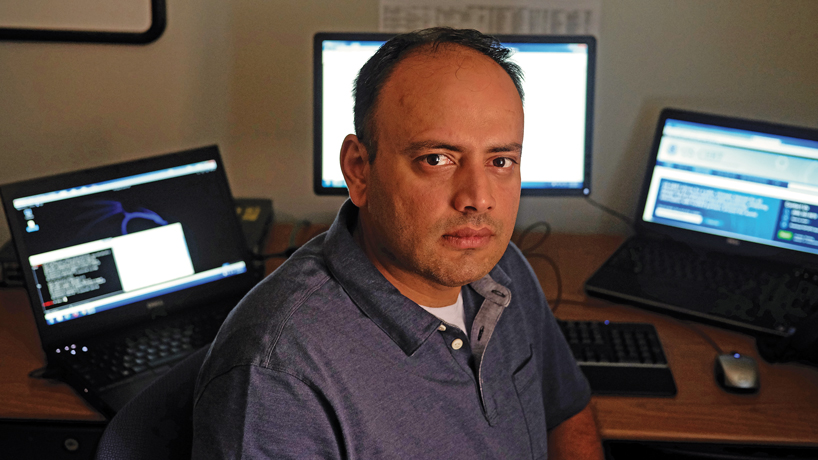Individuals, businesses and governments rely on information technology to get things done. But that comes with a price. Hacked computers, identity theft and leaked information are all-too-common occurrences.
What makes us so vulnerable?
“Our entire business and personal lives are online,” says Shaji Khan, assistant professor of information technology at the University of Missouri–St. Louis. “The more you’re connected, the more exposed you are, and in today’s world, we are always connected.” Khan, along with colleague Maurice Dawson, assistant professor of information systems, has been tasked with creating UMSL’s new Cybersecurity Certificate programs in collaboration with UMSL’s Department of Mathematics and Computer Science.
“The number of ways things can go wrong is unimaginable,” Khan says. “There really is no such thing as 100-percent security, so all we are really trying to do is manage security to a point that the loss would be acceptable.”
Khan, who was born in India, worked as an information technology consultant for several years. He became interested in cybersecurity while earning his doctorate in information systems from UMSL.
“It’s important, no matter what your business focus is, to care about cybersecurity. It’s not just for the IT guys,” he says. “Security touches all aspects of business. It’s getting scarier; we used to only be worried about someone stealing data. Now it’s more real-world.”
After receiving his degree in 2012, he accepted an assistant professor position at Bradley University in Peoria, Ill. “I wanted to come back to UMSL, and when I saw the position open up for cybersecurity, I knew it was meant to be,” he says.
The Cybersecurity Certificate program at UMSL is made up of six courses.
“We are trying to take a holistic approach to creating the next generation of cybersecurity professionals,” Khan says. “You can’t really teach security because it’s so organic. It’s ever-changing and evolving, so our job is to give students the tools and allow them to learn and discover on their own.”
That’s where the Cyber Lab comes in.
“First, we’ve made a completely virtual lab, a ‘sandbox,’ where students are able to log in and ethically hack in a safe environment,” he says. “They are learning penetration testing to see how vulnerable things are and how to make them more secure.”
“Next is the actual computer lab. With donations and support from UMSL’s Information Technology Services and colleges of business and arts and sciences, we’ve created a space where students can go deeper into testing security of networks, computers and applications. It is a place designed to foster innovation and collaboration. Hopefully students will inspire each other and use each other as a resource.”
This story was originally published in the fall 2015 issue of UMSL Magazine.
















